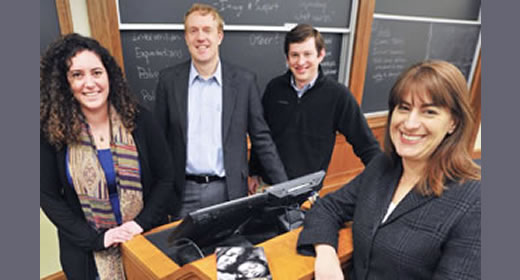
An interdisciplinary approach to urban policy
"Aw yeah. That golden rule." -Bunk Moreland
Dirty and disheveled, Dukie rocks up to his crew in an alley somewhere off Franklin Street in West Baltimore. It's the last day of a long, hot summer, eighth grade looming like a threat. Namond notices Dukie's black eye, courtesy of boys from a rival neighborhood. "What happened to you?" he shouts. "Those Terrace boys banged me coming off the train tracks over there by Ramsay Street," Dukie says. Little Randy pipes up, "They can't whip on Dukie like that." Namond concurs: "Nah, only we can whip on Dukie like that."
What happens next is an ill-conceived battle with the boys from the Terrace houses. Dukie, Namond, and Randy exist only within the narrative of HBO's hit TV drama, The Wire, but their struggles with poverty, violence, family, and a frayed social safety net offer powerful glimpses of inner-city life.
In his award-winning book, Living the Drama: Community, Conflict, and Culture among Inner-City Boys, David J. Harding, associate professor of public policy and sociology, examined the influence of neighborhoods on the views, romantic and sexual behaviors, and outcomes of sixty adolescent black and Latino boys in Boston's poorest areas. One of Harding's key findings concerned the structural quality of pervasive neighborhood violence; what to outsiders may appear to be a dispute based on a petty grievance—stolen swag, say, or a girl's honor—more likely stems from a system of rivalry and conflict that organizes everything from personal identities to movements within and between social spaces.
"...and all the pieces matter." -Lester Freamon
Harding's research into urban poverty, inequality, and incarceration and prisoner re-entry helps make him the ideal person to teach "Urban Public Policy through the Lens of HBO's The Wire," a course that engages these issues by examining inner-city life and, according to the syllabus, "the politics, trade offs, and often unintended consequences of many urban public policy decisions."
The word "teach" may lack imagination, however. The course was conceived and co-developed by Matt Filter (MPP '13), Christina Hajj (MPP '13), and DawnLynne Kacer (MPP '13) during their first year at the Ford School. If anything becomes clear upon sitting in on one of the seminars, it is that a collaborative, evolving experiment is taking place—including weekly guest speakers covering different policy areas, student policy briefs and case studies, and peer discussants who help student presenters interrogate ideas and assumptions. "One thing that's been really beneficial is that a lot of students in class come from so many different backgrounds. It's a safe space to talk about new policy issues and give each other feedback," observes Hajj.
It's an approach Harding encourages and applauds.
"I think it works well. It really gives them ownership and forces them to do the bigger picture thinking of 'what is important here?' What should we talk about? What do we know? What do we not know? Normally in a course, the professor creates the structure and tries to deliver it. I would definitely do this again in another course."
After watching and talking about The Wire among themselves, the three students put out feelers on Facebook to discover who might actually be interested in a public policy course using the show as inspiration.
"We have some great classes at the Ford School on education policy, on labor policy, on drugs, but where can we weave them all together?" says Kacer about their initial brainstorming. The response was phenomenal: more than seventy students expressed an interest. And so it began. "Everyone [in the administration] was very supportive," she continues. "It was interesting because there really wasn't a defined process for students creating a new class."
"I don't think that a lot of other schools would allow students to create their own class out of nothing, and David just volunteered to do it," adds Filter. "I think that's a good success story that the Ford School was receptive to the idea."
"We got our thing, but it's just part of the big thing." -Zenobia Dawson
The course isn't about the television series so much as it is an interdisciplinary synthesis of issues the series has been praised for addressing so realistically, including safety, policing, and crime, as well as education, jobs, economic development, gender, and family. The focus on public policy also makes the Ford School course unique within a veritable cottage industry of university courses around the country that are either based on or inspired by The Wire.
Scholars and even policymakers often conceive of the various domains of urban policy as discrete units, but the course intentionally de-silos these areas—shows how they are interrelated—even as "a lot of the interconnections are between the criminal justice system and other domains, whether we're talking about, neighborhood redevelopment, or education, or the school-to-prison pipeline, or health," explains Harding.
"What does it do to someone's health," he continues, "living in a high crime neighborhood, where they're constantly under the stress of potentially being victimized or having their family and friends victimized? So de-siloing is definitely a big part of it."
The course is a great example of what happens when there is meaningful synchronicity between faculty research and student interest. It demonstrates a larger point, however, about the interdisciplinary nature of public policy. And that's the kind of thinking that will have the most impact on issues facing America's urban centers.
Below is a formatted version of this article from State & Hill, the magazine of the Ford School. View the entire Spring 2013 State & Hill here.